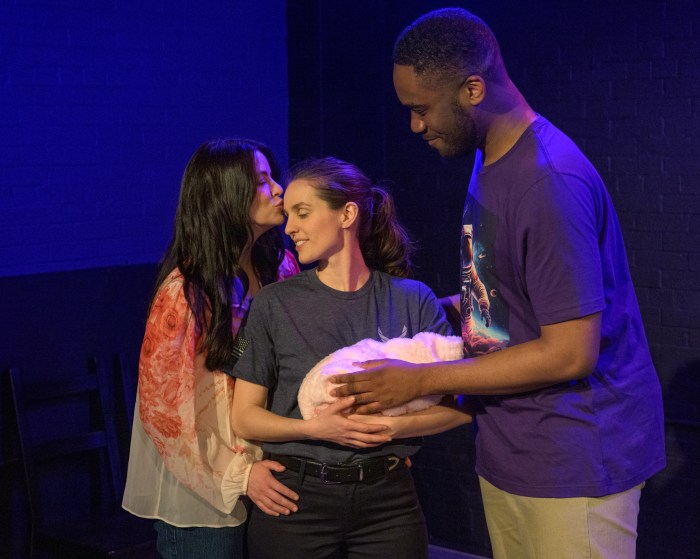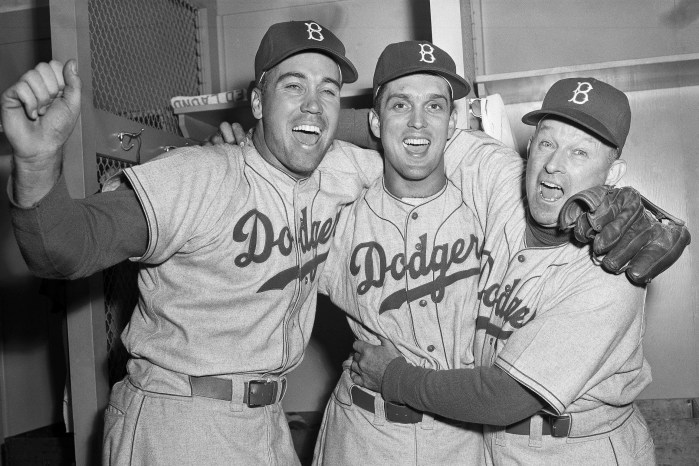Your enjoyment of “Three Pianos,” a frenetic ode to Franz Schubert, will largely hinge on two factors: your affinity for the 19th century Viennese composer, specifically his lugubrious “Winterreise” song cycle, and your tolerance for robust red wine, courtesy of Terra Fossil Wines (it’s imported from Argentina not Austria, but never mind).
That’s because the evening is loosely structured as a modern-day “Schubertiad,” inspired by the raucous parties once hosted by the troubled composer, where he and some buds would play his compositions, debate the nature of music, love, and loneliness, and drink, drink, drink. A tiny plastic glass is handed to you when you pick up your ticket; there’s more than one occasion during the course of the evening when you’re encouraged to fill it.
Fanciful Schubert tribute strikes a few sour notes
By my calculations, however, it would require an entire bottle per theatergoer to fully appreciate the antics onstage.
There are actually multiple parties intermittently going on. The primary one, set in the present-day, is comprised of the show’s creators, a trio of somewhat nerdy dudes in need of good haircuts and wearing ill-fitting sweaters. Dave Malloy is despondent over a breakup with his girlfriend. Rick Burkhardt and Alec Duffy try to diagnose his depression — when they’re not riffing on Schubert and his circle, that is.
Another party features Schubert (Burkhardt), presiding over a motley crew of admirers with “funny German names.” It’s this co-mingling of timeframes, stumbling upon bits of commonality, which lends “Three Pianos” its curious appeal.
Apparently, the production grew out of an impromptu, whiskey-soaked soiree at Judson Church a couple of years back, when the musicians discovered a trove of old sheet music, the “Winterreise” (translation: “Winter’s Journey”) cycle of two dozen songs based on plaintive poems by Wilhelm Müller that Schubert set to music in 1827, just one year before he died from syphilis at age 31.
The men had such a jolly time — Burkhardt reportedly described the evening as the “best party ever” — they wanted to recreate that experience for others. The fiercely committed trio strenuously tries to recapture the magic of that night in story and song, but I had a nagging feeling that it was one of those you-had-to-be-there events.
The narrative structure relies solely on the song cycle, about a lovelorn wanderer through a snowy landscape, often sung in German and translated into English on a large video screen. There is no discernible dramatic arc, the only tension being whether the men can finish the play without passing out. The riot of anachronisms quickly grows tedious.
The characterizations are passable, though it’s clear Malloy, Burkhardt, and Duffy are musicians first, and actors more by accident. Alas, the ersatz booze in their glasses is only juice, and their attempts to convey inebriation are not wholly convincing. Although Rachel Chavkin is credited as director, the way the actors run rampant onstage suggests she spent more effort securing a wine sponsor than actually guiding the production.
That’s not to say that “Three Pianos” doesn’t achieve some engaging moments. I found the historical parts intriguing, as well as the insights about fiery depression, which Schubert harnessed to make art, versus numbing depression. The final song, “Der Leiermann,” performed without antics, is a knockout. The play is at its best when it lets the music speak for itself, and I’d have preferred more music and less banter. The men spend more time pushing the pianos around the stage than actually playing them.
If you’re wondering if the piece dares to broach the question of Schubert’s homosexuality, it does go there, depicting the “Schubertiads” as breeding grounds for lusty male bonding. Both Johann Mayrhofer, who wrote lyrics to many of Schubert’s songs, and 17-year old Schwind von Moritz, who declares he “hates women,” lived with the composer and shared his bed. When asked if he was ever arrested for “subversive activities,” Schubert replies, “It depends on which biography of me you read.”
The piece takes pains to elucidate how ordinary verse can be supercharged when put to music. If nothing else, “Three Pianos” proves that the marriage of Müller’s doleful words and Schubert’s intense notes was sublime.
Unfortunately, the same cannot be said about the marriage of the venue and this play, which runs well over two hours without intermission. A cabaret setting would be much better, to allow less intrusive distribution of the wine — and quicker bathroom access — than the extra long rows at the New York Theater Workshop. It would also offer a hasty escape from the theater, which a few patrons loudly attempted in the middle of the performance I attended.
Complete Information:
THREE PIANOS
New York Theatre Workshop
79 E. 4th Street
Through January 9
Tue. at 7 p.m.; Wed.-Sat. at 8 p.m.
Sat. at 3 p.m.; Sun. at 2 & 7 p.m.
$65; ticketcentral.com
Or 212-279-4200

































